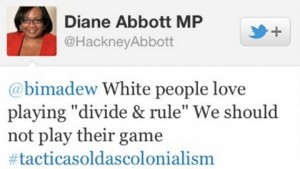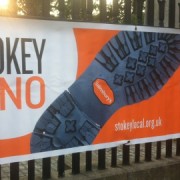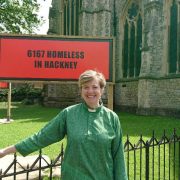 The media storm Hackney MP Diane Abbott caused last week as a result of her ‘divide and rule’ comment on Twitter is indicative of the ways in which Britain’s political elite is still able to turn issues of race and racism to its advantage and brush the lived reality of so many black Britons under the carpet.
The media storm Hackney MP Diane Abbott caused last week as a result of her ‘divide and rule’ comment on Twitter is indicative of the ways in which Britain’s political elite is still able to turn issues of race and racism to its advantage and brush the lived reality of so many black Britons under the carpet.
When Diane Abbott tweeted: “White people love playing ‘divide & rule’ We should not play their game #tacticasoldascolonialism”, she was not referring to 19th century colonialism, which is what she later said to defend her comment. Firstly, if that were the case she would have put the sentence in the past tense. Secondly, the tweet came as part of a conversation about present day politics with Hackney based freelance journalist Bim Adewunmi, who had expressed concern to Abbott about what she perceived to be the red herring ‘black community’.
Conservative blogger Harry Cole, who at times also refers to himself as a journalist, eloquently summed up the deep pain and outrage felt by white people as a result of Abbott’s tweet in his debate with race and human rights activist Lee Jasper on Sky News. He told viewers that Abbott’s comments were derogatory to an entire ethnic group, based on the colour of their skin. Indeed, Cole pointed out, racism works both ways and should not have been used as a political tool by the opportunistic Hackney MP.
Whilst Lee Jasper did a good job of defending Diane Abbott’s record as anti-racist campaigner, he did not attack Cole’s positioning as a victim of a racist jibe, or the notion that white people can also be the victims of racism. He simply laughed, shook his head and said: “Dear, oh dear, oh dear”, which perhaps, in that setting, was the appropriate reaction to Cole’s phony outrage.
But the point needs to be made. In a society where whiteness is the norm and racial otherness – being black, Asian, or Muslim – is still seen as irreconcilable with mainstream Britishness, the notion of anti-white racism rings hollow.
Because its wording is so much more lucid than I could ever put it, I will quote a definition of racism as it appeared in an article in the Guardian last week.
“Racism is the systemic discrimination of whole groups of people cast as outsiders, deemed incapable of full incorporation into society, and treated with suspicion on this basis. It has a deep and lasting effect on individuals’ life chances and consequent wellbeing, and is damaging to the social fabric as a whole.”
The crucial bit follows:
“For all the equivalences drawn between clumsy and prejudicial references to skin colour, racism is inherently political; it requires the power to contribute to racial oppression.”
Do people of colour in Britain have the power to exercise racial oppression over whites? No. Can a black person generalise about white people? Obviously. Is the hurt caused by such a generalisation felt by a white person equivalent to that felt by a black person? Most definitely not.
Diane Abbott’s tweet must be read not as a generalisation about white people, but as coming from a place of honesty and anger over the present state of race politics in Britain. The choice of the term ‘white people’ was far from smart for an MP whose constituency is 61 per cent white, but surely the general idea behind the tweet was historically accurate?
It is unfortunate that those defending Abbott in the media did not make this point. And it is a shame that Abbott, in the media storm that ensued, was forced to backtrack and apologise. Because rather than using this opportunity to talk about racism, its history and its current manifestations, the political establishment posited themselves as victims of a crude generalisation without regard to the context and sentiment of Abbott’s comment. The underlying context of racism Abbott was referring to in her tweet was neatly brushed under the carpet.
The Abbott affair shows that people of colour are in a no-win situation when it comes to getting racism discussed as a lived reality in Britain today. In the case of Stephen Lawrence, there was an acknowledgement of racial injustice, but it was is partial and served after 18 years, largely because of the determination of a single woman, Doreen Lawrence. It is unknown to most Britons that there are countless black mothers like Doreen out there, like those seeking justice for the deaths of sons and daughters at the hands of police officers – singer Smiley Culture and Tottenham’s Mark Duggan being prominent examples of the last year.
The media hype dubbed ‘Abbottgate’ revealed that when a black MP, in her position as community leader, speaks from a place of anger and honesty to one of her constituents, she is hung out to dry and accused of exactly the thing she has been campaigning against all her life.
Diane Abbott merely pointed to the fact that Britain today is still a racist place. The question is – what would it mean to have an actual multiculturalism where the grievances of people of colour around racism are acknowledged and discussed in the same way as issues around education, housing and healthcare? It would certainly upset existing racial hierarchies in society. We are a long way off that scenario, but a good look into divide and rule strategies in British society today may be a good place to continue that process.
Twitter: @KoosCouvee






Just give us a break. Most people are hugely turned off by race baiting.
You obviously didn’t grow up in hackney…
Dear oh dear. If whoever wrote this could perhaps be a little more mature about this rant ?
Diane Abbott is a simple political opportunist with poor judgement. And the whole episode generates only a weary “here she goes again” in most folks. She really should know better.
If you want to be Dave Spart then please write for Private Eye.
Agree with you Dave. I went to NELP and LSE not come across Koos Couvee then again I have grand children his age – meaning he is from a from a different generation.
In order to comment constructively one must know the background well! It is obvious Mr Couvee would be far better qualified to comment were he a local person born and breed. No reason why you could not become well acquainted with the area given time.
Agree with you Dave – as said!
You can try and intellectualise this if you want but the point is that a person publicly made a racist comment. If you believe that is acceptable fair enough, that is your position, I hope you are prepared to defend it. If however you want to qualify racism in terms of how offended somebody might be… then I’m afraid you have lost all credibility. Diane Abbott is simply a bigot. I don’t think this is something to stick up for.
This is just one long, uneducated, hypocritical and self-serving load of utter rubbish.
The whole agenda of now attempting to try and dramatically skew the definition of racism is such a blatant, opportunistic and cynical attempt both to try and perpetuate the single-issue agenda by continuing the alleged bases for such groups’ existence, as well as clear evidence that they have know full well that their whole ‘movement’ has been caught red-handed with their hands in the metaphorical till and are desperate to create a way out.
In this instance the ‘way out’ is to actually ADMIT that, in such nasty, narrow-minded, vicious little groups views they view whites and white culture of any description as a fair target and with none of the protections they demand for themselves. In other words, to further protect their own self-interest and guarantee their freedom to be the sole lips sucking at the teat of this particular money and sympathy fountain.
One of the most notable aspects of this whole cynical and hypocritical campaign is that this Koos Couvee (who?!) actually:
1. Makes snide comments about this Harry Cole (probably becaue he is a Tory blogger) but completely refuses to mention Lee Jasper’s own murky past and reportage; and
2. Again, completely refuses to mention or pose the question as to what exactly would be the situation wherby a white person foes to a majority black or ethnic country, and how this whole argument plays out in that circumstance. This, again, is because those of us with any decency and intelligence know full well that the ‘arguments’ above would still hold, because whites – and only whites – are nothing more than nasty colonialists who need to be ‘put in their place’.
Pure hypocrisy and cynical self-aggrandisement and enrichment in a blatant campaign of dishonesty and deceit.
Utterly shameful and appalling.
Peter – you must be the king of adjectives, amazing. LOL, but your argument’s rubbish.
Excellent piece – nail on the head.
I find the sentiment of the top comments to this article – “you are not from Hackney therefore you can’t have a valid opinion on the subject” – a close-minded response to the issue at hand. The state of race relations in one area holds a mirror to the dominant values of society; racism, even when localised, concerns all of us. Should only people from Eltham be entitled to an opinion on the heinous crime of Norris, Dobson et al because it happened on their doorstep and outsiders aren’t part of that community? Of course not. It is not just up to people in that area to have their say. What Abbot says as an MP isn’t just about Hackney and its people. If you are going to knock down the argument at least have something to say that stands up.
Oh look, if you completely redefine a term you can make it exclusive of some ethnic group! Aren’t you clever. And racist.
The comments in response to this article are simply APPALLING and show a willful determination to disengage from the topic and debate the real issue at hand.
Shameful individuals.